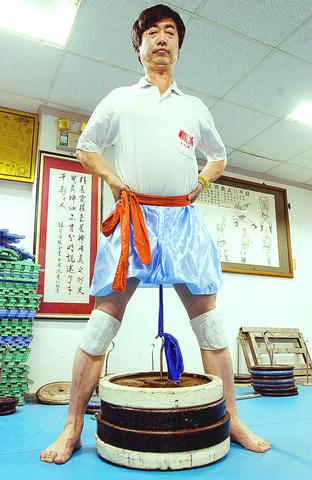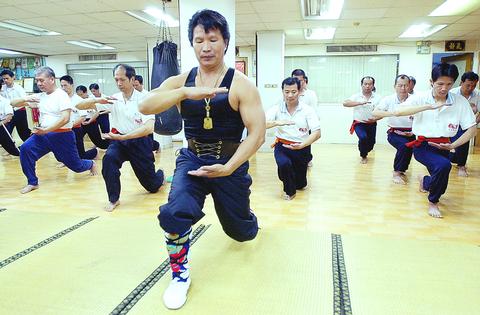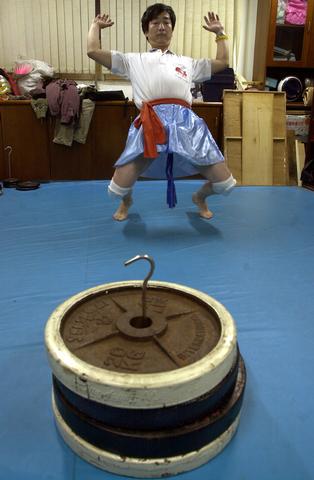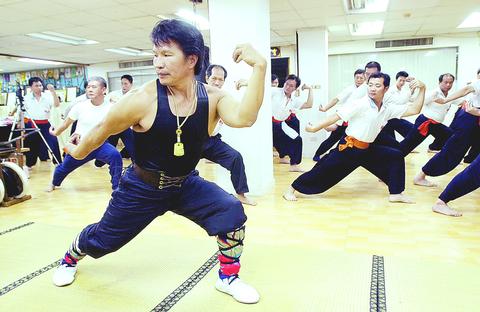On Oct. 29, 2000, three men used chi gung and their penises to pull a flatbed delivery truck across part of a Taipei parking lot. Their success prompted their teacher and mentor, Tu Chin-sheng (涂金盛), to dream up an even grander plan -- using 20 men to tow a 180-tonne Boeing 747.
Tu hoped to accomplish the feat with the blessing and sponsorship of the Guiness Book of World Records. "We will be the first," he said. "We will create the record." But why?
"The first reason is to let people know that there is this kind of Chinese kung fu," he said. "And second, I want to let the students show what they've learned." The pulling and technique, which is practiced by hanging heavy weights from the male genitals, is technically known as yin diao gung (陰吊功, literally translating as something like "genitals hanging kung fu"), or diao gung (吊功) for short. Tu claims that it is in fact an ancient art, its roots tracing back to China's legendary Shaolin Temple (少林寺).

PHOTO: CHEN CHENG-CHANG, TAIPEI TIMES
Tu's own practice of diao gung, however, represents a fusion of Shaolin kung fu and a most singular strain of esoteric Taoism. Tu said he learned the method in Taipei about 25 years ago from Wu Zhen (悟真), a Taoist monk who'd come to Taiwan from Mt Omei (峨嵋山) in Sichuan Province. According to Wu's teachings, diao gung is only the fifth stage in a nine-fold path to enlightenment, with five of the first six stages involving contortion of the penis or testicles.
From this nine step cycle, Tu has taken the name for his dojo, Chiu Chiu Shen Gung (九九神功, literally "nine nine mysterious kung fu"). Of the nine rungs on the method's mystical ladder, however, Tu's chosen diao gung is not necessarily the most curious. The sixth stage, for example, involves drawing water back through the urinary tract and into the bladder by use of a drinking straw. Citing the danger of infection, Tu never learned the technique and refuses to teach it, saying only, "I know that it is done in India."
In comparison to such fantastical athleticism, Chiu Chiu Shen Gung's steps seven through nine seem almost banal. Stage seven involves the channeling of chi (氣), often translated as "energy" or "breath," throughout the body. Stage eight is meditation, and stage nine enlightenment. Claiming no grandeur, Tu says his abilities stop at stage seven, and that he will only teach up through stage five -- diao gung, the technique that has become his hallmark.

PHOTO: CHEN CHENG-CHANG, TAIPEI TIMES
As a person, Tu is nearly as enigmatic as the chi gung he practices. He was born 46 years ago in Chiayi, the sixth of seven sons of a kung fu master, all of whom now teach traditional Chinese martial arts. Tu learned tai chi and chi gung from a master who died at 103 and painting and calligraphy from a master who is now 105.
His sartorial tastes run somewhere between Bruce Lee and a Venice Beach body builder -- cross-laced arm bands, weight belts, mesh camouflage muscle shirts, balloon pants and monastery slippers. He is soft spoken, unassuming, and will pause in the street to let other pedestrians pass. He has built muscles like mountains not by lifting weights, but by dragging 100kg logs through beach sand. He is a certified acupuncturist.
He also loves to perform. And he has been doing it for a long time. Under his father's tutelage, his martial arts performances began in his early teens. In 1975, he was Taiwan's champion in guo shu (國術), the nationally recognized form of competitive martial arts. He later went on to serve as a coach for the team as well as a Taiwan representative to numerous international martial arts competitions and exhibitions. His reputation steadily grew. On occasion, in front of local TV cameras or in front of international audiences, he would break 10 blocks of ice with a single fist or a wooden board with a single finger. Has he ever broken his hand? "Yes, a couple times." He's also pretty honest.

PHOTO: CHEN CHENG-CHANG, TAIPEI TIMES
In 1976, he founded his chi gung training center, Chiu Chiu Shen Gung, in Taipei. Since then, the school's branches have spanned Taiwan, setting up in seven major cities. The Taipei branch alone has more than 100 students. Most of the students are simply interested in chi gung.
Though Tu estimates that around 100 of his former students have gone on to teach diao gung in various parts of Taiwan, he also readily admits that diao gung is not his primary focus. According to Tu, chi gung, an art of physical and internal development, is the source from which Chiu Chiu Shen Gung springs.
Both men and women have come to Tu's chi gung classes on account of neck and back problems, joint problems, bladder control problems and other infirmities. Many of them are advanced in years, and if given the chance, nearly all of them will offer testimonial to their various cures.

PHOTO: CHEN CHENG-CHANG, TAIPEI TIMES
"Most of the people who come here have some kind of health problem," said Chiang Cheng-true (蔣真除), a 57-year-old engineer who claims that some movements in the chi gung routines will even cure a stuffed up nose.
Chen Kuo-ying (陳國英), age 69, came to Taiwan from Indonesia two months ago after hearing about the diao gung truck pull. "Now I have no problem carrying groceries back from the market, and I no longer have to wake up three or four times a night to go to the bathroom," he said thankfully, obviously amazed at the rapid progress he's made.
Yet neither chi gung nor bending steel pipes with blows of his fist -- as Tu sometimes still does -- have made him famous. But diao gung might. To most, it is amazing that men can lift in excess of 150kg with their genitals. Tu himself can dangle up to 60kg while hanging from a chin-up bar.
"You have to get your chi up first," said Wang Hsin-kun (王信焜), an air conditioner installer dressed in a sort of light blue satin kilt and glancing down towards his privates.
Practicing diao gung, he says, is something you don't do cold, it's a several step process. Typically, students start a work-out session by first taking part in a normal chi gung routine. After an hour or so, on this occasion, the class divided and the diao gung'ers passed through a curtain into a special kind of weight room in the back. Iron plates weighing from 1kg to 20kg were scattered over the padded floor as were the devices used for stacking and hoisting those weights. Vertical rods stick up out of these weight hangers at the end of which is a hook for catching a loop in a blue silk ribbon. The ribbon, which is about 15cm wide before it is folded and rolled into a fastening rope, is looped in a lark's head knot around the base of both penis and scrotum, near the point where they join the abdomen.
But this is getting ahead of the process. After the chi gung workout, a diao gung specific warm-up is also necessary. It begins by massaging and stretching the genitals, followed by beating the muscles of the arms, legs and torso with wooden paddles. "It really gets the chi flowing," said Wang.
Comparing diao gung to weightlifting, Wang said that he starts every workout light, using only 1kg. From there he works his way up, maxing out around 60kg, which he holds for only a few seconds, as he did at a recent open house.
Another of Tu's students, Tu Chuen-hsin (涂春心), can heft up to 100kg. A taxi driver of 22 years, he will speak of the tonic powers of chi gung like most other practitioners. And after five or 10 minutes of talking about it, he'll smile, lower his voice, and remark as an aside, "my wife stays good and satisfied."
"Sometimes if you don't warm up," he said, "it will go really fast. But if you use chi gung, you can go for a long time. It comes in handy, especially when you're tired and your wife is in the mood."
Master Tu also makes no secret of diao gung's benefits for virility, saying that a man's testicles begin to shrink when he is 30 and that "exercise" will keep them in shape. Hsieh Ru-tun (謝汝敦), a uroligist at Taiwan University Hospital, says this is not exactly correct however. "After 30, the testicles don't shrink, but men begin producing fewer hormones, which affects the libido but not sexual functioning," he said. "At an advanced age, men can also face andropause, or a cessation of sexual functioning."
Unlike many doctors quoted in Taiwan's local media, however, Hsieh is hesitant to criticize diao gung as dangerous. "Chi gung is not exactly medicine, and I know that acupuncture has been known to cure impotence," he said.
Chen Ruei-hsin (陳銳欣), chief resident of urology and Hsieh's colleague at Taiwan University Hospital, holds a similar opinion despite having treated a penile fracture (a rupture of the tunica albuginea, a key membrane for containing the blood pumped into the penis during an erection) that resulted from diao gung. "If the weight isn't too heavy and there is no erection, there shouldn't be any danger because it is just stretching the skin," he said. "The biggest problem is that it will hurt."
Tu said none of his students has ever been injured (Chen was not sure where his injured patient had practiced diao gung), and his students say that the dangling is not painful. And 20 of them, ranging in age between 30 and 72, are ready and willing to pull a Boeing 747 -- if they can get the chance. The only problem now is finding a plane and a sponsor. After recently contacting Taiwan's EVA Air, Tu was told that the company's planes were in near constant use and thus unavailable. Last Tuesday, the Guiness Book of World Records Museum in Taichung also yanked support, saying first, that "no such record exists," and second, that "we are not interested in such a challenge."
Tu, however, is not dissuaded. "If we can't get a 747, we'll try to pull a military plane at Sungshan Airport," he said. "And if we can't get that, we'll pull a tractor trailer bed holding 500 people."

Nov. 11 to Nov. 17 People may call Taipei a “living hell for pedestrians,” but back in the 1960s and 1970s, citizens were even discouraged from crossing major roads on foot. And there weren’t crosswalks or pedestrian signals at busy intersections. A 1978 editorial in the China Times (中國時報) reflected the government’s car-centric attitude: “Pedestrians too often risk their lives to compete with vehicles over road use instead of using an overpass. If they get hit by a car, who can they blame?” Taipei’s car traffic was growing exponentially during the 1960s, and along with it the frequency of accidents. The policy

While Americans face the upcoming second Donald Trump presidency with bright optimism/existential dread in Taiwan there are also varying opinions on what the impact will be here. Regardless of what one thinks of Trump personally and his first administration, US-Taiwan relations blossomed. Relative to the previous Obama administration, arms sales rocketed from US$14 billion during Obama’s eight years to US$18 billion in four years under Trump. High-profile visits by administration officials, bipartisan Congressional delegations, more and higher-level government-to-government direct contacts were all increased under Trump, setting the stage and example for the Biden administration to follow. However, Trump administration secretary

In mid-1949 George Kennan, the famed geopolitical thinker and analyst, wrote a memorandum on US policy towards Taiwan and Penghu, then known as, respectively, Formosa and the Pescadores. In it he argued that Formosa and Pescadores would be lost to the Chine communists in a few years, or even months, because of the deteriorating situation on the islands, defeating the US goal of keeping them out of Communist Chinese hands. Kennan contended that “the only reasonably sure chance of denying Formosa and the Pescadores to the Communists” would be to remove the current Chinese administration, establish a neutral administration and

A “meta” detective series in which a struggling Asian waiter becomes the unlikely hero of a police procedural-style criminal conspiracy, Interior Chinatown satirizes Hollywood’s stereotypical treatment of minorities — while also nodding to the progress the industry has belatedly made. The new show, out on Disney-owned Hulu next Tuesday, is based on the critically adored novel by US author Charles Yu (游朝凱), who is of Taiwanese descent. Yu’s 2020 bestseller delivered a humorous takedown of racism in US society through the adventures of Willis Wu, a Hollywood extra reduced to playing roles like “Background Oriental Male” but who dreams of one day